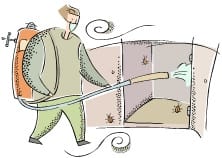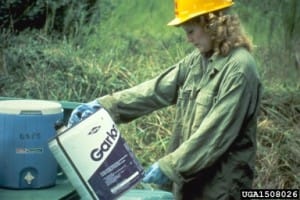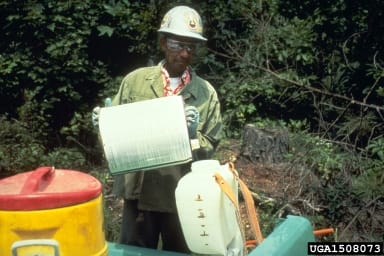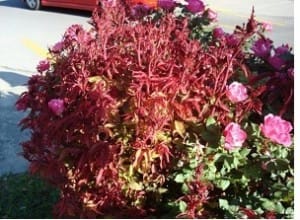Most certified pesticide applicators eventually run into a situation where they have old or excess pesticides that they no longer use. How can commercial pesticide applicators properly dispose of these pesticides?
Here are some tips from the Georgia Department of Agriculture and UGA Extension:
1. First, do not dispose of these pesticides in an illegal or unsafe way. Do not pour them into storm drains and other drains, put them into trash cans, or use other similar disposal methods. These disposal systems do not have the ability to degrade these pesticides properly and the pesticide can quickly put people and the environment at risk. This may also cause a liability problem for you personally or for your company. Local waste management services are often not equipped to handle pesticide disposal, but you can contact them to ask about their policies.
2. The best method to dispose of old or unwanted pesticides is by using it per label directions. Be careful to use it on a labeled crop, at the labeled rate with all recommended precautions. Even with an old pesticide that may not effectively kill the labeled pest, follow the label! Just because a pesticide is old and perhaps ineffective for its original use, does not mean it is not toxic. Follow all label precautions when applying any pesticide including wearing the required personal protection equipment. We are seeing more impacts of pesticides on people and the environment and we must all work to avoid these!
Apply the pesticide in a place where it is least likely to impact people and the environment. Consider that though you must use the pesticide per the label, you do not necessarily have to use the pesticide for the purpose or location for which you bought it. For instance, you may have bought a pesticide for use inside a structure. It may not make sense to apply the pesticide inside just to get rid of it. The same pesticide may also be labeled for use outside in a field, forest, lawn, landscape etc. When disposing of pesticides by applying them, select a location where there will be less risk to people or the environment. However, the location and application method you select must be allowed by the label.
3. If the pesticide is not too old, share it with someone who will use the pesticide legally. The exception to this would be restricted use pesticides (RUPs). Do not share RUPs with someone else, but rather use them yourself. If you give an RUP to another person and they use it incorrectly, you may be liable. And remember – the RUP pesticide was purchased under your license number!
When sharing a pesticide consider that:
- The pesticide must remain in the original container and with the label.
- The user must follow all label directions. Select a pesticide applicator to receive the pesticide that will be willing and able to legitimately use the chemical according to the label.
4. Certain companies dispose of pesticides for a fee. There will usually be a set up fee and a per pound fee. If you must go this route, try to gather all your un-needed pesticides at one time so that you pay only one set-up fee. The company may also be able to dispose of other unwanted chemicals for you.
5. Container disposal – Empty metal, plastic or glass pesticide containers should be pressured rinsed or triple rinsed. The rinse water should be directed into the spray tank. Containers must then be crushed or punctured to prevent reuse. Once containers are cleaned this way, they can be recycled or disposed of in a landfill. Contact your local Extension office for information on recycling programs.
Paper pesticide containers must be fully emptied and then torn to make sure they are empty. They can then be wrapped in paper and disposed of as solid waste in a landfill. It is illegal to burn empty pesticide bags in Georgia!
6. The GA Department of Agriculture realized the need for pesticide disposal and implemented a very successful pesticide disposal program called the GA Clean Days. From its inception through 2008 the GA Clean Days disposed of more than 2 million pounds of pesticides! This program had not been funded for several years but Georgia Department of Agriculture received funding for five Clean Days in 2013. The Department of Agriculture hopes that the program will be funded again in 2014. Interested individuals may want to contact their state legislators to express an interest in seeing the program funded again in 2014. For more information on GA Clean Days or other pesticide issues, contact Joshua Wiley at Joshua.Wiley@agr.georgia.gov. See an article on the 2013 GA Clean Day program here.
7. Reduce the need to dispose of pesticides by following these tips:
- Buy only the amount of pesticide you will use quickly.
- Use pesticides before they get old. Use your oldest stock first so that none of your pesticides become too old to use. This means labeling the container with the date you bought the pesticide so you can use the oldest first.
- Proper handling and storage, per label directions, may lengthen the effective life of the pesticide. For instance – allowing liquid pesticides to freeze can ruin their effectiveness. Read the label for storage and use information.
In summary:
- Using unwanted pesticides per label directions is usually the best disposal method, even if you think the pesticide may not effectively control the pest.
- Read the pesticide label to select a place and application method to apply the pesticide that is both legal and safe for people and the environment.
- Apply the pesticide to this site following all label directions and precautions including any required personal protection equipment and posting.
- Containers must be properly cleaned before disposal. Disposal method depends on the container type.
For more information see these publications. Some information in this article was taken from some of these references:
- The pesticide label may contain other disposal information or contact the Georgia Department of Agriculture – (800) 282-5852
- See the publications – Safe Handling of Pesticides or Use Pesticides Safely
- Contact your local UGA Extension Office.





